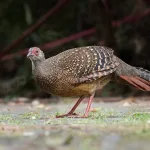Garden gnomes, quaint and often seen as mere decorative items, carry with them a deeper spiritual significance that finds roots in folklore and myth.
These small statues typically depict bearded men with pointed hats and are a common sight in gardens around the world.
Historically, they were thought to be protectors of the earth, guarding over flora and fauna with a silent but steadfast vigilance.
They embody the spirit of protection, believed by some to keep away thieves and pests while nurturing the life force of the plants around them.
The spiritual importance of these creatures extends to various aspects of well-being and fortune.
Many individuals place garden gnomes in their outdoor spaces with the faith that they bring good luck and prosperity.
The gnomes’ connection to the land and their traditional role as keepers of the garden align with the idea of fostering a harmonious and prosperous environment.
They are also tied to a sense of wisdom, seen as age-old beings that hold knowledge and secrets of the natural world.
In contemporary interpretations, garden gnomes continue to serve as more than just ornaments; for many, they are a symbol of a spiritual connection to nature.
This connection emphasizes a balance that many seek in their own lives—a symbiotic relationship with the earth and a reminder of the unseen forces that, folklore suggests, have a gentle influence on the world around us.
Read too: Spiritual Meaning Of Wind Chimes (In 2023)
What does a garden gnome symbolize?

Garden gnomes are replete with symbolism, and their presence in gardens extends beyond mere decoration.
Historically, they have been seen as protectors of the land, originally placed in fields to safeguard against thieves and pests.
They are believed to emanate a protective energy, acting as guardians over the nighttime garden.
Connection with nature is another significant aspect of garden gnome symbolism. They are often depicted in harmony with the natural world, symbolizing the elements of fertility, growth, and the continuous cycles of life.
In the spiritual realm, garden gnomes hold various meanings. One interpretation suggests that they represent an earthly connection, rooted deeply in the lore of elemental spirits.
The concept of garden gnomes being linked with earth elements is supported by their frequent association with the earth in mythology and popular culture.
The idea of garden gnomes as a male presence is a common theme; however, representations have grown to include female gnomes, reflecting a more inclusive understanding of these mystical figures.
- Spiritual Protectors: Symbolize safety and protection for gardens.
- Earth Connection: Embody the relationship with natural elements and cycles.
Ultimately, garden gnomes can be seen as a whimsical embodiment of humanity’s age-old relationship with the earth, with a layer of spiritual significance that appeals to the mystical and adds an aura of wonder to the simple garden landscape.
9 Spiritual Meanings of Garden Gnome
1) Protectors
Garden gnomes have long been associated with the idea of protection. They are visual representations of guardians, offering a sense of security for the space they inhabit.
Traditionally, these statues are placed in gardens where they are believed to safeguard plants and ward off harm.
Within these spaces, gnomes symbolize a barrier against negativity. They serve as silent sentinels, standing watch over the greenery and blooms.
Homeowners place them with the hope that they will protect against both physical pests and negative energies.
The belief in gnomes as protectors extends beyond the physical realm. They are thought to provide a shield against unseen spiritual nuisances, creating a serene environment. Their presence echoes a folklore-rich history of mythical guardians of the earth.
2) Good Luck
Gnomes are often seen as bearers of good fortune. This belief stems from their storied connection to the earth and its abundance.
Many believe that by welcoming a gnome into one’s garden or home, they are inviting prosperity and wellbeing.
The perception of gnomes as lucky figures encourages their use as ornamental pieces.
Whether it’s success in personal endeavors or bountiful harvests, gnomes are silent cheerleaders for positive outcomes.
Gardeners and homeowners alike value these quaint figures for their promise of good luck.
In many cultures, the gnome is more than décor; it is an amulet. The positive energy attributed to gnomes turns them into symbols of hope and luck.
They are small, but their perceived impact on the fortunes of a household is significant.
3) Fertility
A less obvious but enduring spiritual meaning of garden gnomes relates to fertility. They are frequently connected with burgeoning life and the earth’s fecundity.
This symbolism points to their reputed role in ensuring the growth and vitality of plants.
In gardens, gnomes signify an abundance of life and the continuous cycle of growth.
Their portrayal often includes earthy motifs, underscoring their connection with the natural world. The presence of a gnome is seen as an encouragement for plants to flourish.
This concept of fertility also extends to human endeavors, alluding to creativity and the birth of ideas.
Gnomes represent nurturing and the care needed to bring new projects or ambitions to fruition. Their association with the earth symbolizes a grounding influence on such pursuits.
4) Guardians
The notion of gnomes as guardians cuts across various spiritual interpretations. These figurines are looked upon as the protectors of secrets and sacred spaces.
By placing gnomes in a garden, it is believed they stand guard over the private sanctity of one’s outdoor retreat.
Their role as guardians anchors them in a position of watchfulness and vigilance. They embody the principle of steadfast guardianship, representing a constancy in the ever-changing natural world.
A garden gnome is perceived to be both witness and keeper to the rhythms of life that unfold around it.
As silent overseers, gnomes carry the responsibility of guardianship with a stoic resolve. The tranquil and often whimsical appearance of these statues belies their significance as spiritual sentinels.
Their guardianship spans both the tangible and intangible aspects of the spaces they watch over.
5) Garden Design
Beyond their spiritual meanings, garden gnomes contribute aesthetically as elements of garden design.
They provide a whimsical touch, adding personality and charm to garden landscapes.
Throughout the years, gnomes have evolved in style, reflecting the tastes and artistic expressions of different periods.
Gnomes can complement a garden’s theme or stand out as focal points of interest.
They are versatile characters that adapt to various design narratives—be they rustic, fantastical, or modern.
Each statue can tell a story, contributing to the garden’s overall visual narrative.
Their presence in garden design also reflects a desire for personal expression. Garden gnomes allow individuals to imbue their outdoor spaces with a sense of creativity and flair.
They are as much a reflection of the gardener’s spirit as they are of garden aesthetics.
If you are enjoying reading this, you will definitely enjoy reading Spiritual Meaning Of Smelling Eucalyptus (Symbolism)

6) Negative Energy
A spiritual dimension ascribed to garden gnomes involves their perceived ability to absorb negative energy.
Positioned within a garden or yard, these statues are thought to attract and neutralize negative influences.
Many owners believe in the gnome’s mystical capacity to create a harmonious environment.
In this role, gnomes serve as spiritual filters. They are envisaged as a force that balances energies, fostering tranquility where they are placed.
This capacity for energy regulation makes them popular in spaces dedicated to relaxation and meditation.
Mitigating negativity, gnomes play a part in the spiritual well-being of a space.
Their placement is often intentional, aimed at maximizing their influence on the environment’s energetic health.
They are silent combatants against the unseen chaos that can infiltrate a peaceful setting.
7) Male and Female Gnomes
The differentiation between male and female gnomes carries its own spiritual weight. Each is often imbued with distinct qualities, reflecting traditional gender roles or attributes observed in nature.
Male gnomes may be depicted as the protectors or workers, while female gnomes might embody nurturing and the spirit of growth.
This division allows for a balance in energies represented by the gnomes. It mirrors the diversity found in the natural world and human cultures.
The relationship between male and female gnomes in a garden can symbolize partnership and harmony.
The depictions of male and female gnomes foster a completeness in the spiritual narrative of the garden.
They create stories and scenarios that enrich the garden’s atmosphere, making the space more dynamic and integral. Their presence celebrates the unity and variety of life.
8) Prosperity
Gnomes are commonly linked with the theme of prosperity. This association harks back to tales where gnomes are guardians of treasure or embody the richness of the earth.
In gardens, they remind owners of the wealth present in nature and the potential for personal abundance.
Their role as symbolic harbingers of prosperity makes them popular in homes and businesses. People set up garden gnomes with the hope that they will attract success and affluence.
These figurines are thought to stand for the bountiful rewards of diligent work and care.
This spiritual meaning casts gnomes as little beacons of economic and spiritual wealth.
By aligning with the gnome’s representation of prosperity, people often feel a sense of reassurance and optimism.
They are seen as cheerleaders, quietly supporting the prosperity of those they stand among.
9) Connection with Earth
Finally, garden gnomes symbolize a deep connection with the earth. They are often designed to be in harmony with natural elements, suggesting a oneness with the environment.
Their mythological roots as earth dwellers make them messengers of the planet’s wisdom and beauty.
In positioning gnomes amidst foliage and flora, there is an implicit recognition of their link with the earth’s cycles.
They become characters in the ongoing story of nature, their immobility a stark contrast to the dynamic life around them.
Gnomes are reminders of the enduring presence of nature, even in crafted spaces like gardens.
Their earthy nature influences their spiritual presence, grounding the space they occupy.
Gnomes urge observers to pause and reflect on the natural world and our place within it. They anchor a garden’s spiritual essence, embodying the cycle of life, death, and
A little history

Garden gnomes have a storied past, intertwining with various cultural traditions and folklore.
They trace their origins to 19th-century Germany, where they were first created in the region of Thuringia, known for its skilled craftspeople in ceramics and pottery.
The earliest gnomes were modeled after mythological creatures from European folklore, namely the gnome or erdkobold, believed to be earth-dwelling spirits.
These beings were thought to guard the earth’s treasures while being benevolent towards humans, often helping in gardens and farmland, making them natural figures to represent in garden sculptures.
By the 1840s, they had become popular in other parts of Europe, with Sir Charles Isham bringing them to England, thus starting what would become a widespread garden ornament tradition in the West.
Initially serving as guardians of crops and protectors of the garden, these statues also held symbolic value for prosperity and good luck.
Garden gnomes further evolved through time, a mix of legend and craftsmanship.
Their protective role diminished as they became more decorative, yet they retained symbolic meanings linked to good fortune, guardianship, and a deep-rooted connection with the natural world.
These figurines continue to populate gardens, providing a whimsical nod to their rich historical background and the various attributes bestowed upon them by gardeners and folklore enthusiasts alike.
Before you leave, read Spiritual Meaning Behind A Four-Leaf Clover (Good Luck?)
Final Words

Garden gnomes carry a multitude of symbolic significances that reflect both historical beliefs and modern-day interpretations.
Their presence in gardens is often attributed to purposes that go beyond mere decoration:
- Protection: They are commonly perceived as guardians, safeguarding the home and garden.
- Good Luck: Many individuals associate gnomes with bringing good fortune and prosperity to their surroundings.
- Nature Spirits: Gnomes are traditionally regarded as stewards of the earth, with a role in nurturing the natural world.
The variety of representations, from protectors to harbingers of good luck, exemplify a rich tapestry of spiritual meanings tied to these figurines.
Regardless of whether one sees them as whimsical additions to their garden or as symbols with profound meanings, garden gnomes continue to be a charming and enigmatic element of cultural folklore.
Their small stature belies the weighty symbolism they carry, often serving as a connection to the ancient and mystic aspects of nature that modern life tends to overlook.








